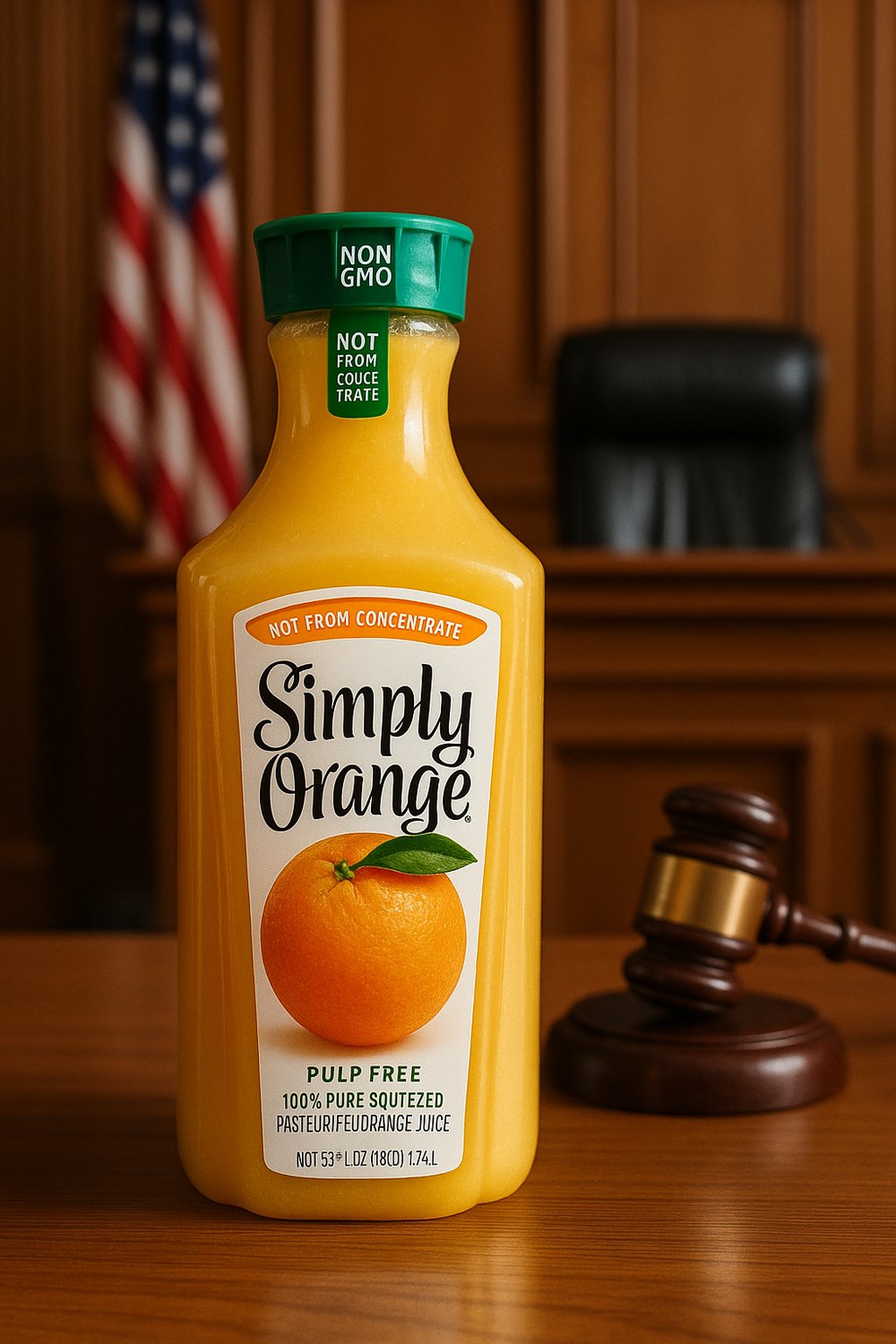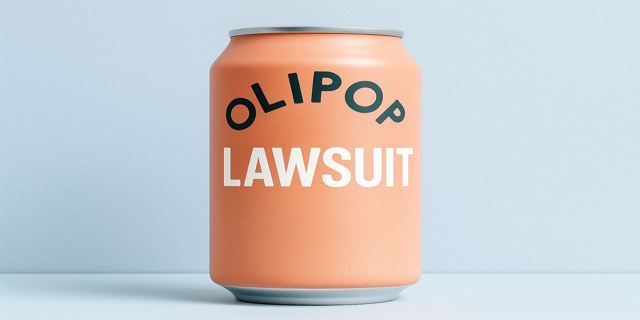The Simply Orange lawsuit has rocked the beverage industry and concerned consumers. The lawsuit claims Coca-Cola’s Simply Beverages sold orange juice contaminated with toxic PFAS – known as “forever chemicals”. These claims are directly at odds with Simply Orange’s marketing of its product as “all natural”.
Independent lab testing identified concerning levels of PFAS in Simply Orange Juice which led to a national class-action lawsuit. The plaintiffs claim that they paid a premium for what they thought was a pure and healthy beverage. The case highlights a public concern surrounding PFAS exposures, companies’ responsibility to consumers, and the premise that companies should be responsible and ensure their products do not harm the public’s health.
As of June 2025, the lawsuit still ongoing and active. The Court allowed critical claims to continue and as a result, this case has been positioned as a bellwether case for future cases involving PFAS. Consumers, regulators, and other food brands are all watching closely how the Simply Orange lawsuit unfolds. With that in mind, this article will provide you with everything you need to know about the case and its ongoing implications.
What Triggered the Simply Orange Lawsuit?
Consumers relied on Simply Orange Juice to deliver a product it represented fairly, pure, natural juice. However, the latter was tested and traced for PFAS, to which litigation followed.
What Made PFAS Headlines?
In the end of 2022, Simply Orange Juice had samples tested by an independent laboratory. What they found was a high level of PFAS in the Simply Orange Juice sample, a group of poisonous and synthetic chemicals that don’t break down naturally. These findings directly repudiated Simply Orange Juice’s “All Natural” branding.
PFAS contamination lead to consumer outrage. Health experts specifically pointed out that consuming even a small amount of PFAS could have long-term impacts. After this, plaintiffs brought a proposed class-action lawsuit against Coca-Cola, attached with claims that Coca-Cola had engaged in deceptive practices.
What Does the Lawsuit Allege?
The Simply Orange lawsuit claims that Coca-Cola:
Marketed Simply Orange Juice as “all natural” and pure
Failed to disclose the presence of PFAS
Profited through false advertising and consumer deception
Violated state consumer protection laws
This case is not isolated. It reflects a larger movement challenging misleading food and beverage labeling.
Why Are PFAS So Concerning?
Public reaction to the Simply Orange lawsuit is reflected in the public health ramifications associated with PFAS exposure, a well-researched topic in health studies. Understanding the health risks of PFAS exposure is necessary to understand why this case is important.
What Are PFAS?
PFAS refers to per- and polyfluoroalkyl substances. These synthetic chemicals are resistant to heat, water and oil. PFAS have been used by manufacturers in thousands of products, including:
Non-stick cookware
Water-repellent clothing
Food packaging
Firefighting foams
These chemicals are considered “forever chemicals” because they’re durable and do not break down naturally, they can accumulate in the environment and people.
What are the health risks to people from PFAS exposure?
There are scientific studies linking PFAS exposure to a variety of serious health symptoms. The U.S. Environmental Protection Agency (EPA) and other agencies also warn us that PFAS can:
Increase cancer risk
Damage the liver and kidneys
Disrupt hormonal balance
Weaken the immune system
Affect child development
These dangers explain why the presence of PFAS in a popular juice brand triggered legal action and public concern.
What Legal Claims Define the Simply Orange Lawsuit?
The Simply Orange lawsuit is built on multiple legal arguments. Together, they aim to hold Coca-Cola accountable for its product’s safety and marketing.
What Are the Core Legal Allegations?
Plaintiffs accuse Coca-Cola of:
False advertising: Marketing the juice as “all natural” despite PFAS contamination
Negligence: Failing to ensure product safety and purity
Unjust enrichment: Profiting from deceptive marketing and consumer trust
Breach of warranty: Violating express claims about product quality
The lawsuit emphasizes that consumers would not have purchased Simply Orange Juice had they known about the PFAS.
What Evidence Supports the Case?
Key evidence presented in the Simply Orange lawsuit includes:
Independent lab tests confirming PFAS presence
Marketing materials touting the juice’s purity
Expert testimony on PFAS health risks
Economic analyses showing how consumers paid a premium
This combination of scientific, legal, and financial evidence strengthens the plaintiffs’ position.
How Has Coca-Cola Responded to the Lawsuit?
Facing mounting pressure, Coca-Cola has taken a defensive stance. The company denies wrongdoing and challenges the plaintiffs’ claims.
What Arguments Has Coca-Cola Made?
Coca-Cola contends that:
Simply Orange Juice complies with applicable safety standards
PFAS contamination likely results from unavoidable environmental factors
No evidence proves intentional PFAS addition
Plaintiffs cannot demonstrate direct harm or economic loss
The company argues that it behaves responsibly and transparently regarding product safety.
What has Coca-Cola done legally?
In response to the Simply Orange lawsuit, Coca-Cola filed a motion to dismiss, some parts of which the court granted and some parts it did not allow to be dismissed.
The parties in the Simply Orange lawsuit are now engaged in the discovery phase, which means both sides are exchanging evidence and deposing experts. The case is in progress.
What is the status of the Simply Orange lawsuit?
The Simply Orange lawsuit continues to move through the U.S. legal system. Right now, this is a valuable stage to understand how the case will continue.
Is the case still active?
Yes. As of June 2025, the Simply Orange lawsuit is still active. The court allowed claims on important issues, primarily false advertising and unjust enrichment, to proceed.
What Are the Next Legal Steps?
Upcoming stages in the lawsuit include:
Further discovery, including review of Coca-Cola’s internal records
Expert depositions to evaluate PFAS testing and health impact evidence
Pre-trial conferences to set timelines and trial expectations
There is no final trial date, but lawyers expect the case to settle or go to trial by 2026.
What Are the Wider Implications of the Simply Orange Case?
The effects of the Simply Orange case are more significant than a single brand. It represents a broader movement of courts and consumers taking a stance on food safety and corporate accountability.
Could Other Brands Face Similar Lawsuits?
Definitely. The case could create a precedent for challenging PFAS contamination in other products. Legal experts indicate brands with “natural” or “pure” products are potentially in harm’s way. Recent PFAS-related lawsuits have targeted:
Bottled water brands
Packaged snacks
Personal care products
As awareness of PFAS risks grows, more companies could face similar legal challenges.
Could the Lawsuit Influence Regulations?
Yes. The Simply Orange lawsuit aligns with increasing regulatory attention on PFAS. Government agencies are taking action:
The EPA has proposed strict drinking water standards for PFAS
Several states have enacted laws limiting PFAS in food packaging
Consumer advocacy groups are pushing for broader federal regulations
Legal outcomes in cases like this could accelerate regulatory reforms and shape future food safety standards.
What Is the Latest in the Simply Orange Lawsuit?
Staying updated on the Simply Orange lawsuit is crucial, as developments continue to unfold.
What Happened in 2024 and 2025?
The timeline of key recent events includes:
2024: The court rejected Coca-Cola’s motion to dismiss in part
Early 2025: Plaintiffs submitted additional lab tests confirming PFAS presence
Spring 2025: Discovery expanded to include Coca-Cola’s internal testing and marketing practices
June 2025: The lawsuit remains active, with a pre-trial conference expected later this year
Observers note that the case is gaining momentum, and plaintiffs remain confident.
What Compensations Are Consumers Seeking?
Understanding what plaintiffs aim to achieve in the Simply Orange lawsuit highlights the stakes involved.
What Remedies Are Being Requested?
Plaintiffs seek:
Full refunds for consumers misled by “all natural” marketing
Statutory damages where state laws permit
Punitive damages to deter future deceptive practices
Court orders mandating improved testing and labeling
Reimbursement of legal fees and litigation costs
If successful, the lawsuit could deliver significant compensation and drive industry-wide changes.
How to File a Simply Orange Lawsuit?
Many consumers wonder whether they can participate in the Simply Orange lawsuit and how to do so.
Who Can Join the Class Action?
The lawsuit was filed as a proposed nationwide class action. If the court certifies the class, eligible consumers will receive notice.
You may qualify if:
You purchased Simply Orange Juice during the relevant period
You relied on marketing or labeling that claimed the product was “all natural”
How do I make a claim?
The lawsuit is currently in the discovery phase. The formal claims process has not commenced yet. Once the class is formally certified and either settlements or judgments are reached, consumers affected will receive formal direction on how to file claims.
Until that time, we recommend you stay updated through credible legal news outlets and advocacy organizations.
Conclusion
The Simply Orange lawsuit underscores the increasingly public awareness of PFAS contamination in everyday products. The lawsuit is about having trusted products that claim “natural” or “pure” ingredients.
Coca Cola’s case exemplifies just how challenging it is to know if products will be safe in such as contaminated world, while the plaintiffs are arguing for transparency and responsibility. Depending on the outcome of the case, changes in practice across the food space, as well as new regulations could arise in jurisdictions across North America.
As Simply Orange continues to work its way through the courts until 2025, it reminds us that consumers are entitled to expect honesty and safety from the brands we use and trust. As well, it may foster some protections against exposure to PFAS in products we consume.
FAQs
What is the Simply Orange lawsuit about?
It is a class action alleging that Simply Orange Juice contains PFAS, contradicting its “all natural” marketing.
Is the Simply Orange lawsuit settled?
No. As of June 2025, the lawsuit remains active and is advancing through pre-trial discovery.
Can I join the Simply Orange lawsuit?
Possibly. If the court certifies the class, eligible consumers will be able to submit claims.
What are PFAS?
PFAS are toxic “forever chemicals” linked to cancer, hormonal disruption, liver damage, and other health risks.
What compensation are consumers seeking?
Plaintiffs seek full refunds, damages, improved labeling, and legal costs from Coca-Cola.
Ayesha Awais is a content writer for JudicialNexus.com, covering accident reports, injury-related news, lawsuits, and public safety updates. All content is informational in nature and based on publicly available sources.




